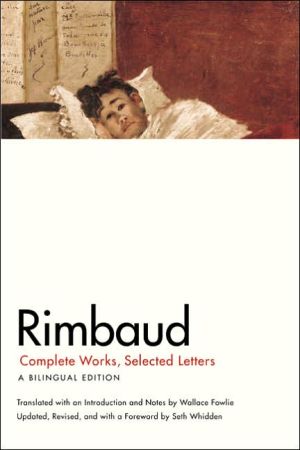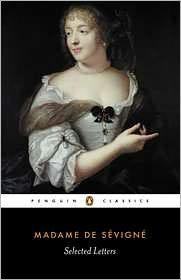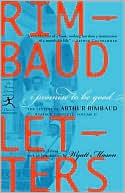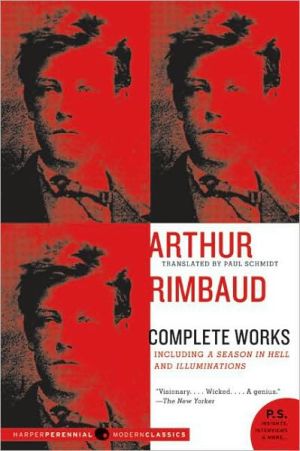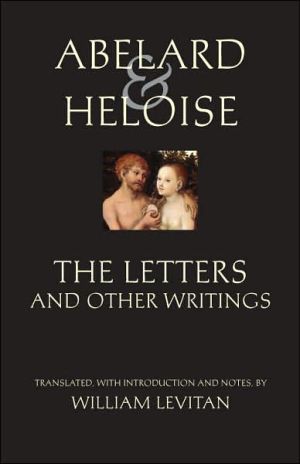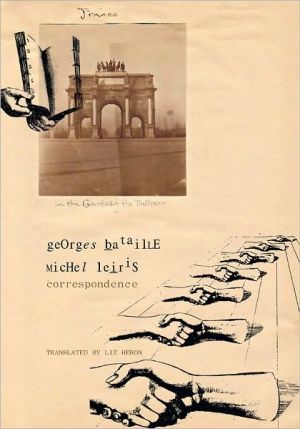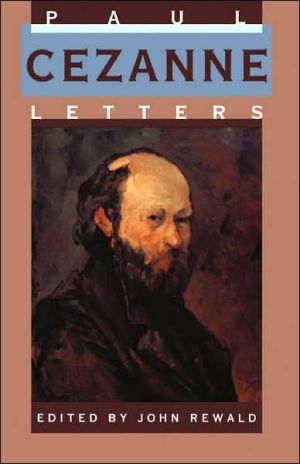Rimbaud: Complete Works, Selected Letters
"The enfant terrible of French letters, Jean-Nicholas-Arthur Rimbaud (1854-91) was a defiant and precocious youth who wrote some of the most remarkable prose and poetry of the nineteenth century, all before leaving the world of verse by the age of twenty-one. More than a century after his death, the young rebel-poet continues to appeal to modern readers as much for his turbulent life as for his poetry; his stormy affair with fellow poet Paul Verlaine and his nomadic adventures in eastern...
Search in google:
The enfant terrible of French letters, Jean-Nicholas-Arthur Rimbaud (1854-91) was a defiant and precocious youth who wrote some of the most remarkable prose and poetry of the nineteenth century, all before leaving the world of verse by the age of twenty-one. More than a century after his death, the young rebel-poet continues to appeal to modern readers as much for his turbulent life as for his poetry; his stormy affair with fellow poet Paul Verlaine and his nomadic adventures in eastern Africa are as iconic as his hallucinatory poems and symbolist prose. The first translation of the poet's complete works when it was published in 1966, Rimbaud: Complete Works, Selected Letters introduced a new generation of Americans to the alienated genius—among them the Doors's lead singer Jim Morrison, who wrote to translator Wallace Fowlie to thank him for rendering the poems accessible to those who "don't read French that easily." Forty years later, the book remains the only side-by-side bilingual edition of Rimbaud's complete poetic works. Thoroughly revising Fowlie's edition, Seth Whidden has made changes on virtually every page, correcting errors, reordering poems, adding previously omitted versions of poems and some letters, and updating the text to reflect current scholarship; left in place are Fowlie's literal and respectful translations of Rimbaud's complex and nontraditional verse. Whidden also provides a foreword that considers the heritage of Fowlie's edition and adds a bibliography that acknowledges relevant books that have appeared since the original publication. On its fortieth anniversary, Rimbaud remains the most authoritative—and now, completely up-to-date—edition of the young master's entire poetic ouvre.
\ Rimbaud Complete Works, Selected Letters\ A Bilingual Edition \ \ By Arthur Rimbaud The University of Chicago Press \ Copyright © 2005 \ The University of Chicago \ All right reserved.\ \ ISBN: 978-0-226-71977-1 \ \ \ Chapter One Poésies/Poetry \ 1869/1869\ Les étrennes des orphelins I La chambre est pleine d'ombre; on entend vaguement De deux enfants le triste et doux chuchotement. Leur front se penche, encor, alourdi par le rêve, Sous le long rideau blanc qui tremble et se soulève ... -Au dehors les oiseaux se rapprochent frileux; Leur aile s'engourdit sous le ton gris des cieux; Et la nouvelle Année, à la suite brumeuse, Laissant traîner les plis de sa robe neigeuse, Sourit avec des pleurs, et chante en grelottant ... II Or les petits enfants, sous le rideau flottant, Parlent bas comme on fait dans une nuit obscure. Ils écoutent, pensifs, comme un lointain murmure ... Ils tressaillent souvent à la claire voix d'or Du timbre matinal, qui frappe et frappe encor Son refrain métallique en son globe de verre ... -Puis, la chambre est glacée ... on voit traîner à terre, Épars autour des lits, des vêtements de deuil: L'âpre bise d'hiver qui se lamente au seuil Souffle dans le logis son haleine morose! On sent, dans tout cela, qu'il manque quelque chose ... -Il n'est donc point de mère à ces petits enfants, De mère au frais sourire, aux regards triomphants? Elle a donc oublié, le soir, seule et penchée, D'exciter une flamme à la cendre arrachée, D'amonceler sur eux la laine et l'édredon Avant de les quitter en leur criant: pardon. Elle n'a point prévu la froideur matinale, Ni bien fermé le seuil à la bise hivernale? ... -Le rêve maternel, c'est le tiède tapis, C'est le nid cotonneux où les enfants tapis, Comme de beaux oiseaux que balancent les branches, Dorment leur doux sommeil plein de visions blanches! ... -Et là,-c'est comme un nid sans plumes, sans chaleur, Où les petits ont froid, ne dorment pas, ont peur; Un nid que doit avoir glacé la bise amère ... III Votre coeur l'a compris:-ces enfants sont sans mère. Plus de mère au logis!-et le père est bien loin! ... -Une vieille servante, alors, en a pris soin. Les petits sont tout seuls en la maison glacée; Orphelins de quatre ans, voilà qu'en leur pensée S'éveille, par degrés, un souvenir riant ... C'est comme un chapelet qu'on égrène en priant: -Ah! quel beau matin, que ce matin des étrennes! Chacun, pendant la nuit, avait rêvé des siennes Dans quelque songe étrange où l'on voyait joujoux, Bonbons habillés d'or, étincelants bijoux, Tourbillonner, danser une danse sonore, Puis fuir sous les rideaux, puis reparaître encore! On s'éveillait matin, on se levait joyeux, La lèvre affriandée, en se frottant les yeux ... On allait, les cheveux emmêlés sur la tête, Les yeux tout rayonnants, comme aux grands jours de fête, Et les petits pieds nus effleurant le plancher, Aux portes des parents tout doucement toucher ... On entrait! ... Puis alors les souhaits ... en chemise, Les baisers répétés, et la gaîté permise! IV Ah! c'était si charmant, ces mots dits tant de fois! -Mais comme il est changé, le logis d'autrefois: Un grand feu pétillait, clair, dans la cheminée, Toute la vieille chambre était illuminée; Et les reflets vermeils, sortis du grand foyer, Sur les meubles vernis aimaient à tournoyer ... -L'armoire était sans clefs! ... sans clefs, la grande armoire! On regardait souvent sa porte brune et noire ... Sans clefs! ... c'était étrange! ... on rêvait bien des fois Aux mystères dormant entre ses flancs de bois, Et l'on croyait ouïr, au fond de la serrure Béante, un bruit lointain, vague et joyeux murmure ... -La chambre des parents est bien vide, aujourd'hui: Aucun reflet vermeil sous la porte n'a lui; Il n'est point de parents, de foyer, de clefs prises: Partant, point de baisers, point de douces surprises! Oh! que le jour de l'an sera triste pour eux! -Et, tout pensifs, tandis que de leurs grands yeux bleus Silencieusement tombe une larme amère, Ils murmurent: "Quand donc reviendra notre mère?" V Maintenant, les petits sommeillent tristement: Vous diriez, à les voir, qu'ils pleurent en dormant, Tant leurs yeux sont gonflés et leur souffle pénible! Les tout petits enfants ont le coeur si sensible! -Mais l'ange des berceaux vient essuyer leurs yeux, Et dans ce lourd sommeil met un rêve joyeux, Un rêve si joyeux, que leur lèvre mi-close, Souriante, semblait murmurer quelque chose ... -Ils rêvent que, penchés sur leur petit bras rond, Doux geste du réveil, ils avancent le front, Et leur vague regard tout autour d'eux se pose ... Ils se croient endormis dans un paradis rose ... Au foyer plein d'éclairs chante gaîment le feu ... Par la fenêtre on voit là-bas un beau ciel bleu; La nature s'éveille et de rayons s'enivre ... La terre, demi-nue, heureuse de revivre, A des frissons de joie aux baisers du soleil ... Et dans le vieux logis tout est tiède et vermeil: Les sombres vêtements ne jonchent plus la terre, La bise sous le seuil a fini par se taire ... On dirait qu'une fée a passé dans cela! ... -Les enfants, tout joyeux, ont jeté deux cris ... Là, Près du lit maternel, sous un beau rayon rose, Là, sur le grand tapis, resplendit quelque chose ... Ce sont des médaillons argentés, noirs et blancs, De la nacre et du jais aux reflets scintillants; Des petits cadres noirs, des couronnes de verre, Ayant trois mots gravés en or: "À NOTRE MÈRE!" The Orphans' Gifts (New Year's) I The room is full of darkness; indistinctly you hear The sad soft whispering of two children. Their heads lean down, still, heavy with dreams, Under the long white (bed) curtain which trembles and rises ... -Outside birds feeling the cold crowd together; Their wings are numbed under the grey color of the skies; And the New Year, with her train of fog, Dragging the folds of her snowy robe, Smiles through her tears, and, while shivering, sings ... II But the small children, under the swaying curtain, Speak in low voices as you do on a dark night. They listen thoughtfully as to a distant murmur ... Often they tremble at the clear golden voice Of the morning bell, which strikes again and again Its metallic refrain under its glass globe ... -Then, the room is icy ... you see lying on the floor, Scattered around the beds, mourning clothes: The bitter wind of winter moaning on the threshold Blows into the house its sad breath! You feel, in all this, that something is missing ... -Is there then no mother for these small children, No mother with a fresh smile and triumphant glances? So she forgot, in the evening, alone and leaning down, To kindle a flame saved from the ashes, And to pile over them the wool and the quilt Before leaving them, and calling out to them: forgive me! Did she not foresee the cold of the morning, Did she not close tightly the door on the winter wind? ... -A mother's dream is the warm blanket, The downy nest where children, huddled Like beautiful birds rocked by the branches, Sleep their sweet sleep full of white visions! ... -And here-it is like a nest without feathers, without warmth, Where the children are cold and do not sleep and are afraid; A nest the bitter wind must have frozen ... III Your heart has understood:-these children are motherless. No mother in the home!-and the father far away! ... -An old servant, then, has taken care of them. The little ones are all alone in the icy house; Four-year-old orphans in whose thoughts now A smiling memory awakens gradually ... It is like a rosary you tell as you pray: -Ah! what a beautiful morning, this New Year's morning! During the night each had dreamt of his dear ones In some strange dream when you saw toys, Candies dressed in gold, sparkling jewels, Whirling and dancing a sonorous dance, Then disappearing under curtains, and reappearing! You awoke in the morning, you got up in a joyous mood, Your mouth watering, rubbing your eyes ... You went, your hair tangled on your head, Your eyes shining as on holidays, And your little bare feet grazing the floor, Softly touching your parents' doors ... You went in! ... And then the good wishes ... in your nightshirt, The flood of kisses, and gaiety allowed! IV Ah! it was so charming, those words spoken so often! -But how it has changed, the home we once had: A big fire crackled brightly in the fireplace, The old room was all aglow; And the red reflections, coming from the big hearth, Like to play over the varnished furniture ... -The cupboard had no keys! ... no keys in the big cupboard! You often looked at its dark black door ... No keys! ... it was strange! ... You often wondered About the mysteries sleeping in its wooden sides, And you thought you could hear, from the depths of the gaping Keyhole, a distant noise, a vague joyful murmur ... -The parents' room is empty today: No red reflection shone under the door; There are no parents, no hearth, no stolen keys: And therefore no kisses, no sweet surprises! Ah! how sad New Year's Day will be for them! -And pensively, while from their big blue eyes A bitter tear silently drops, They murmur: "When will our mother return?" V Now the children are sleeping sadly: On seeing them you would say they are crying in their sleep, So swollen are their eyes and so painful their breathing! Small children have such sensitive hearts! -But the angel of cradles comes to wipe their eyes, And into their heavy sleep puts a happy dream, So happy a dream that their half-closed lips, Smiling, seem to murmur something ... -They dream that, leaning on their small round arms, In the sweet gesture of waking up, they raise their heads, And peer around them ... They think they fell asleep in a rose-colored paradise ... In the bright hearth, the fire merrily sings ... Through the window a beautiful blue sky is visible over yonder; Nature awakens and is drunk with the rays of light ... The earth, half-bare, happy to come alive again, Stirs with joy under the kisses of the sun ... And in the old house everything is warm and red: The black clothes are no longer spread over the floor, The wind has at last quieted down under the door ... You could say that a fairy had passed through the scene! ... -The children, very happy, uttered two cries ... Here, Near the mother's bed, under a beautiful rose-colored ray, Here, on the big rug, something shines ... They are silver medallions, black and white, Mother-of-pearl and jet with glittering lights; Small black frames, glass wreaths, With three words engraved in gold: "TO OUR MOTHER!"\ 1870/1870\ Sensation Par les soirs bleus d'été, j'irai dans les sentiers, Picoté par les blés, fouler l'herbe menue: Rêveur, j'en sentirai la fraîcheur à mes pieds. Je laisserai le vent baigner ma tête nue. Je ne parlerai pas, je ne penserai rien: Mais l'amour infini me montera dans l'âme, Et j'irai loin, bien loin, comme un bohémien, Par la Nature-heureux comme avec une femme. Sensation In the blue summer evenings, I will go along the paths, And walk over the short grass, as I am pricked by the wheat: Daydreaming I will feel the coolness on my feet. I will let the wind bathe my bare head. I will not speak, I will have no thoughts: But infinite love will mount in my soul; And I will go far, far off, like a gypsy, Through the countryside-joyous as if with a woman.\ Soleil et chair I Le Soleil, le foyer de tendresse et de vie, Verse l'amour brûlant à la terre ravie, Et, quand on est couché sur la vallée, on sent Que la terre est nubile et déborde de sang; Que son immense sein, soulevé par une âme, Est d'amour comme dieu, de chair comme la femme, Et qu'il renferme, gros de sève et de rayons, Le grand fourmillement de tous les embryons! Et tout croît, et tout monte! hommes, Cybèle; S'il n'avait pas laissé l'immortelle Astarté Qui jadis, émergeant dans l'immense clarté Des flots bleus, fleur de chair que la vague parfume, Montra son nombril rose où vint neiger l'écume, Et fit chanter, Déesse aux grands yeux noirs vainqueurs, Le rossignol aux bois et l'amour dans les coeurs! II Je crois en toi! je crois en toi! Divine mère, Aphrodité marine!-Oh! la route est amère Depuis que l'autre Dieu nous attelle à sa croix; Chair, Marbre, Fleur, Venus, c'est en toi que je crois! -Oui l'Homme est triste et laid, triste sous le ciel vaste, Il a des vêtements, parce qu'il n'est plus chaste, Parce qu'il a sali son fier buste de dieu, Et qu'il a rabougri, comme une idole au feu, Son corps Olympien aux servitudes sales! Oui, même après la mort, dans les squelettes pâles Il veut vivre, insultant la première beauté! -Et l'Idole où tu mis tant de virginité, Où tu divinisas notre argile, la Femme, Afin que l'Homme pût éclairer sa pauvre âme Et monter lentement, dans un immense amour, De la prison terrestre à la beauté du jour, La Femme ne sait plus même être Courtisane! -C'est une bonne farce! et le monde ricane Au nom doux et sacré de la grande Venus! III Si les temps revenaient, les temps qui sont venus! -Car l'Homme a fini! l'Homme a joué tous les rôles! Au grand jour, fatigué de briser des idoles Il ressuscitera, libre de tous ses Dieux, Et, comme il est du ciel, il scrutera les cieux! L'Idéal, la pensée invincible, éternelle, Tout le dieu qui vit, sous son argile charnelle, Montera, montera, brûlera sous son front! Et quand tu le verras sonder tout l'horizon, Contempteur des vieux jougs, libre de toute crainte, Tu viendras lui donner la Rédemption sainte! -Splendide, radieuse, au sein des grandes mers Tu surgiras, jetant sur le vaste Univers L'Amour infini dans un infini sourire! Le Monde vibrera comme une immense lyre Dans le frémissement d'un immense baiser: -Le Monde a soif d'amour: tu viendras l'apaiser. * * * (O! l'Homme a relevé sa tête libre et fière! Et le rayon soudain de la beauté première Fait palpiter le dieu dans l'autel de la chair! Heureux du bien présent, pâle du mal souffert, L'Homme veut tout sonder,-et savoir! La Pensée, La cavale longtemps, si longtemps oppressée S'élance de son front! Elle saura Pourquoi! ... Qu'elle bondisse libre, et l'Homme aura la Foi! -Pourquoi l'azur muet et l'espace insondable? Pourquoi les astres d'or fourmillant comme un sable? Si l'on montait toujours, que verrait-on là-haut? Un Pasteur mène-t-il cet immense troupeau De mondes cheminant dans l'horreur de l'espace? Et tous ces mondes-là, que l'éther vaste embrasse, Vibrent-ils aux accents d'une éternelle voix? -Et l'Homme, peut-il voir? peut-il dire: je crois? La voix de la pensée est-elle plus qu'un rêve? Si l'homme naît si tôt, si la vie est si brève, D'où vient-il? Sombre-t-il dans l'Océan profond Des Germes, des Foetus, des Embryons, au fond De l'immense Creuset d'où la Mère-Nature Le ressuscitera, vivante créature, Pour aimer dans la rose, et croître dans les blés? ... Nous ne pouvons savoir!-Nous sommes accablés D'un manteau d'ignorance et d'étroites chimères! Singes d'hommes tombés de la vulve des mères, Notre pâle raison nous cache l'infini! Nous voulons regarder:-le Doute nous punit! Le doute, morne oiseau, nous frappe de son aile ... -Et l'horizon s'enfuit d'une fuite éternelle! ... * * * Le grand ciel est ouvert! les mystères sont morts Devant l'Homme, debout, qui croise ses bras forts Dans l'immense splendeur de la riche nature! Il chante ... et le bois chante, et le fleuve murmure Un chant plein de bonheur qui monte vers le jour! ... -C'est la Rédemption! c'est l'amour! c'est l'amour! ...) * * * IV Ô splendeur de la chair! ô splendeur idéale! Ô renouveau d'amour, aurore triomphale Où, courbant à leurs pieds les Dieux et les Héros Kallipige la blanche et le petit Eros Effleureront, couverts de la neige des roses, Les femmes et les fleurs sous leurs beaux pieds écloses! -Ô grande Ariadné, qui jettes tes sanglots Sur la rive, en voyant fuir là-bas sur les flots Blanche sous le soleil, la voile de Thésée, Ô douce vierge enfant qu'une nuit a brisée, Tais-toi! Sur son char d'or brodé de noirs raisins, Lysios, promené dans les champs Phrygiens Par les tigres lascifs et les panthères rousses, Le long des fleuves bleus rougit les sombres mousses. Zeus, Taureau, sur son cou berce comme une enfant Le corps nu d'Europé, qui jette son bras blanc Au cou nerveux du Dieu frissonnant dans la vague, Il tourne lentement vers elle son oeil vague; Elle, laisse traîner sa pâle joue en fleur Au front de Zeus; ses yeux sont fermés; elle meurt Dans un divin baiser, et le flot qui murmure De son écume d'or fleurit sa chevelure. -Entre le laurier rose et le lotus jaseur Glisse amoureusement le grand Cygne rêveur Embrassant la Léda des blancheurs de son aile; -Et tandis que Cypris passe, étrangement belle, Et, cambrant les rondeurs splendides de ses reins, Étale fièrement l'or de ses larges seins Et son ventre neigeux brodé de mousse noire, -Héraclès, le Dompteur, qui, comme d'une gloire, Fort, ceint son vaste corps de la peau du lion, S'avance, front terrible et doux, à l'horizon! Par la lune d'été vaguement éclairée, Debout, nue, et rêvant dans sa pâleur dorée Que tache le flot lourd de ses longs cheveux bleus, Dans la clairière sombre où la mousse s'étoile, La Dryade regarde au ciel silencieux ... -La blanche Séléné laisse flotter son voile, Craintive, sur les pieds du bel Endymion, Et lui jette un baiser dans un pâle rayon ... -La Source pleure au loin dans une longue extase ... C'est la Nymphe qui rêve, un coude sur son vase, Au beau jeune homme blanc que son onde a pressé. -Une brise d'amour dans la nuit a passé, Et, dans les bois sacrés, dans l'horreur des grands arbres, Majestueusement debout, les sombres Marbres, Les Dieux, au front desquels le Bouvreuil fait son nid, -Les Dieux écoutent l'Homme et le Monde infini! Sun and Flesh I The Sun, hearth of tenderness and life, Pours burning love over the delighted earth, And, when one lies down in the valley, one smells How the earth is nubile and rich in blood; How its huge breast, raised by a soul, Is made of love, like god, and of flesh, like woman, And how it contains, big with sap and rays of light, The vast swarming of all embryos! And everything grows, and everything rises! -O Venus, O Goddess! I miss the days of ancient youth, Of lascivious satyrs, of animal fauns, Gods who bit, because of love, the bark of boughs And in the midst of water lilies kissed the blond Nymph! I miss the time when the world's sap, The river's water, and the rose blood of green trees Put a universe into the veins of Pan! When the earth trembled, green, under his goatfeet; When, softly kissing the fair Syrinx, his lips Formed under heaven the great hymn of love; When, standing on the plain, he heard about him Living Nature answer his call; When the mute trees, cradling the singing bird, The earth cradling man, and the entire blue Ocean And all animals loved, loved in God! I miss the time of great Cybele Who was said to traverse, gigantically beautiful, In a great bronze chariot, magnificent cities; Her two breasts poured into the immense depths The pure stream of infinite life. Man sucked joyfully at her blessed nipple, Like a small child playing on her knees. -Because he was strong, Man was chaste and gentle. Woe! Now he says: I comprehend things, And goes off, with eyes closed and ears closed: -And yet, no more gods! no more gods! Man is King, Man is God! But Love is the great Faith! Oh! if man still drew strength from your nipple, Great mother of gods and men, Cybele; If only he had not abandoned immortal Astarte Who, once, emerging in the immense light Of blue waves, flower-flesh the wave perfumes, Showed her rose-colored navel where the foam came snowing, And-a Goddess with great conquering black eyes-made the nightingale Sing in the woods and love in the hearts! II I believe in you! I believe in you! Divine mother, Aphrodite of the sea!-Oh! the way is bitter Since the other God harnessed us to his cross; Flesh, Marble, Flower, Venus, I believe in you! -Yes, Man is sad and ugly, sad under the vast sky. He has clothes because he is no longer chaste, Because he has defiled his proud head of a god, And bent down, like an idol in the fire, His Olympian body to base serfdom! Yes, even after death, in pale skeletons He wishes to live, insulting the original beauty! -And the Idol in whom you placed such virginity, In whom you made our clay divine, Woman, So that Man might illuminate his poor soul And slowly rise, in boundless love, From the prison of earth to the beauty of day, Woman no longer knows even how to be a Courtesan! -It's a good joke! and the world jeers At the sweet and sacred name of great Venus! III If the times which have passed came back! -For Man is finished! Man has played all roles! By day, weary of smashing idols He will revive, free of all his gods, And, as he is of heaven, he will scan the skies! The Ideal, the invincible eternal thought, The whole god who lives, under his clay of flesh, Will rise, will rise, and burn under his brow! And when you see him sounding the whole horizon, A despiser of old yokes, free from all fear, You will come and give him holy Redemption! -Resplendent, radiant, from the bosom of vast oceans You will rise up, casting over the wide Universe Infinite Love in its infinite smile! The World will vibrate like an immense lyre In the trembling of an immense kiss: -The World thirsts for love: you will come and slake its thirst. * * * (Oh! Man has raised his free proud head! And the sudden ray of original beauty Makes the god tremble in the altar of his flesh! Happy with the present good, pale from the ill suffered, Man wills to sound all depths-and know! Thought, A jade for so long, and oppressed for so long, Springs from his brow! She will know Why! ... Let her leap free, and Man will have Faith! -Why the silent sky and the unfathomable space? Why the golden stars swarming like sand? If one mounted forever, what would one see up there? Does a Shepherd drive that huge flock Of worlds journeying through the horror of space? And do all those worlds, embraced by the vast ether, Tremble at the sound of an eternal voice? -Can Man see? can he say: I believe? Is the voice of thought more than a dream? If man is born so soon, if life is so brief, Whence does he come? Does he sink into the deep Ocean Of Germs, of Foetuses, of Embryos, to the bottom Of the huge Crucible where Mother Nature Will revive him, a living creature, To love in the rose, and to grow in the wheat? ... We cannot know!-We are weighed down Under a cloak of ignorance and narrow chimeras! Apes of men, fallen from our mothers' wombs, Our pale reason hides the infinite from us! We try to see:-and Doubt punishes us! Doubt, gloomy bird, strikes us with its wing ... -And the horizon rushes off in an eternal flight! ... * * * The great sky is open! the mysteries are dead Before erect Man crossing his strong arms In the vast splendor of rich nature! He sings ... and the wood sings, and the river murmurs A song full of joy which rises toward daylight! ... -It is Redemption! it is love! it is love! ...) * * * IV O splendor of flesh! O ideal splendor! O renewal of love, triumphal dawn When, prostrating Gods and Heroes at their feet White Callipyge and little Eros, Covered with the snow of roses, Will lightly touch women and flowers full-blown under their beautiful feet! -O great Ariadne, who pour your sobs Over the shore, as you see over there on the waves The white sail of Theseus flying under the sun; O sweet virgin child whom a night has crushed, Be silent! On his golden chariot embroidered with black grapes, Lysios, drawn through the Phrygian fields By lascivious tigers and russet panthers, Reddens the dark moss along the blue rivers. Zeus, the Bull, cradles on his neck like a child The naked body of Europa, who throws her white arm Around the God's tensed neck trembling in the wave, He slowly turns his vague eyes toward her; She, lets her pale flower cheek rest On the brow of Zeus; her eyes are closed; she dies In a divine kiss, and the murmuring wave Flowers her hair with its golden foam. -Between the oleander and the blatant lotus Glides amorously the great dreaming Swan Embracing Leda with the whiteness of his wing; -And while Cypris goes by, strangely beautiful, And, arching the splendid roundness of her back, Proudly displays the gold of her large breasts And snowy belly embroidered with black moss, -Hercules, the Tamer, who, as with a nimbus, Strongly girds his huge body in a lion skin, And appears on the horizon, his brow terrible and benign! Vaguely lit by the summer moon, Erect, naked, and dreaming in her gilded pallor, Spotted by the heavy wave of her long blue hair, In the dark glade where the moss is starred, The Dryad looks up at the silent sky ... -White Selene, timid, lets her veil float Over the feet of handsome Endymion, And throws him a kiss in a pale ray ... -The Spring far off weeps in a long ecstasy ... It is the Nymph, one elbow on her urn, dreaming Of the handsome white youth her wave pressed against. -A light wind of love passed in the night, And in the sacred wood, in the horror of the great trees, Majestically erect, the dark Marbles, The Gods, on whose brows the Bullfinch makes its nest, -The Gods listen to Man and to the infinite World!\ (Continues...)\ \ \ \ \ Excerpted from Rimbaud Complete Works, Selected Letters by Arthur Rimbaud Copyright © 2005 by The University of Chicago. Excerpted by permission.\ All rights reserved. No part of this excerpt may be reproduced or reprinted without permission in writing from the publisher.\ Excerpts are provided by Dial-A-Book Inc. solely for the personal use of visitors to this web site.\
List of Illustrations Foreword (2005) by Seth Whidden Acknowledgments Selected Bibliography (a partial listing of works published since 1966) Introduction (1966) by Wallace Fowlie Poésies / Poetry 1869 / 1869 Les étrennes des orphelins / The Orphans' Gifts (New Year's) 1870 / 1870 Sensation / Sensation Soleil et chair / Sun and Flesh Ophélie / Ophelia Venus Anadyomène / Venus Anadyomene Première soirée / The First Evening Les reparties de Nina / Nina's Replies "Morts de Quatre-vingt-douze [. . .]" / "Dead of '92 [. . .]" Les effarés / The Frightened Ones Roman / Novel Rêvé pour l'hiver / A Dream for Winter Le buffet / The Cupboard L'éclatante victoire de Sarrebrück / The Dazzling Victory of Sarrebruck Le maline / The Sly Girl Au Cabaret-Vert / At the Cabaret-Vert Le dormeur du val / The Sleeper in the Valley À la musique / To Music Bal des pendus / Dance of the Hanged Men Le châtiment de Tartufe / Tartufe's Punishment Le forgeron / The Blacksmith Ma bohème (Fantaisie) / My Bohemian Life (Fantasy) Le mal / Evil Rages de Césars / Caesars' Rages Poèmes datés de 1871 - début 1872 ou dans des lettres de mai ou juin 1871 / Poems dated 1871 - early 1872 or in letters from May or June 1871 Le coeur volé / The Stolen Heart Chant de guerre parisien / Parisian War Song Mes petitesamoureuses / My Little Lovers Accroupissements / Squattings Les poètes de sept ans / Seven-year-old Poets L'orgie parisienne ou Paris se repeuple / Parisian Orgy or Paris is Repopulated Les pauvres À l'église / The Poor in Church Les soeurs de charité / Sisters of Charity L'homme juste / The Just Man Les premières Communions / First Communions Ce qu'on dit au Poète À propos de fleurs / What is Said to the Poet Concerning Flowers Les mains de Jeanne-Marie / The Hands of Jeanne-Marie Poèmes non datés (fin 1870 - début 1872?) / Undated poems (late 1870 - early 1872?) Les assis / The Sedated Men Le bateau ivre / The Drunken Boat Les chercheuses de poux / The Seekers of Lice Les douaniers / The Customs Men "L'étoile a pleuré rose [. . .]" / "The star wept rose-colored [. . .]" Oraison du soir / Evening Prayer Tête de faune / Faun's Head Voyelles / Vowels Album zutique (fin 1871 - début 1872?) / Album called "zutique" (end 1871 - 1872?) Sonnet du trou du cul / Sonnet to an Asshole Lys / Lily Vu À Rome / Seen in Rome Fête galante / Love Feast "J'occupais un wagon de troisième [. . .]" / "I occupied a third-class carriage [. . .]" "Je préfère sans doute [. . .]" / "Doubtless I prefer [. . .]" "L'Humanité chaussait [. . .]" / "Humanity was putting shoes on [. . .]" Conneries / Nasty Jokes Jeune goinfre / Young Glutton Paris / Paris Cocher ivre / Drunken Coachman Vieux de la vieille! / The Old Man of the Old Woman! état de siège? / State of Siege? Le balai / The Brush Exil / Exile L'angelot maudit / The Outcast Cherub "Mais enfin, c' [. . .]" / "But finally, th [. . .]" "Les soirs d'été [. . .]" / "Summer evenings [. . .]" Bouts-rimés / Rhymed endings "Aux livres de cchevvet [. . .]" / "To the bedside books [. . .]" Hypotyposes saturniennes, ex Belmontet / Saturnian Hypotyposes, taken from Belmontet Les remembrances du vieillard idiot / Memories of the Simple-minded Old Man Ressouvenir / Remembrance D'autres poèmes de la période dite "zutique" (1871-1872?) / Other poems from the period called "zutique" (1871-1872?) "Nos fesses ne sont pas les leurs [. . .]" / "Our backsides are not theirs are not theirs [. . .]" "Les anciens animaux [. . .]" / "Ancient animals [. . .]" Vers pour les lieux / Verses for Such Places "De ce siège si mal tourné [. . .]" / "Of this seat so poorly made [. . .]" "Quand le fameux Tropmann [. . .]" / "When the famous Tropmann [. . .]" Poèmes datés de, transcritts ou publiés en 1872 / Poems dated, transcribed, or published in 1872 Comédie de la soif / Comedy of Thirst Bonne pensée du matin / A Good Thought in the Morning La rivière de Cassis / The Cassis River Larme / Tear Patience / Patience Chanson de la plus haute tour / Song of the Highest Tower L'éternité / Eternity âge d'or / Golden Age Jeune ménage / Young Couple "Est-elle almée? [. . .]" / "Is she an almeh? [. . .]" Fêtes de la fa
